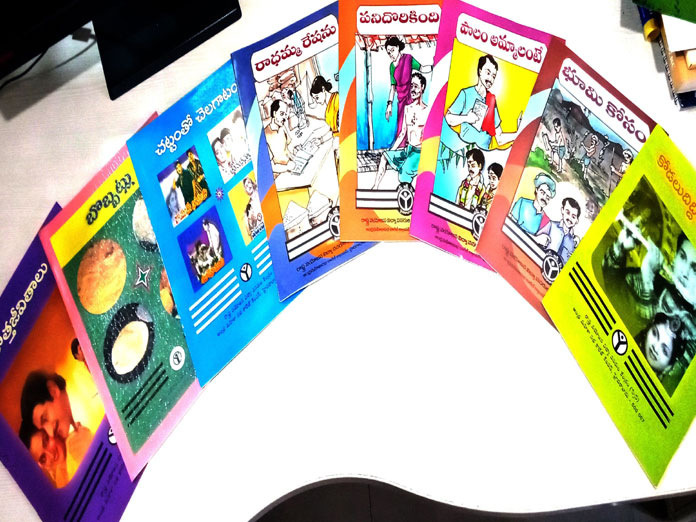Live
- Congress dares KTR for open debate on farm loan waiver
- Hanging power cables to be a thing of past soon?
- Eureka! Hyd-based NMRI dishes out eco-friendly portable slaughterhouse
- Rekhachithram Review: An inventive thriller that blends nostalgia and mystery
- India Open 2025: Indian challenge ends as Satwik-Chirag go down in semi-finals
- Israel intercepts missile fired from Yemen toward Red Sea's Eilat
- Pravinkoodu Shappu Review: Pravinkoodu Shappu impresses with its visuals and performances but doesn't fully fulfill its potential
- Do not breach party discipline, No loose talk about party positions -Bhandari
- 'Celebrities and village sarpanch not safe, what about common people': Cong slams MahaYuti govt
- Lebanese President urges Israeli withdrawal from South Lebanon within deadline
Just In
SRC unveils road map to promote ‘mother tongue’ among masses


The State Resource Centre SRC, Hyderabad, has adopted a series of innovative methods in promoting learning of mother tongue among massesAccording to Dr Bandi Sayanna, Director of SRC, We have to reach to the illiterates and neoliterates We must creating interest in the learning process and then guide them from nonformal to the formal stream of literacy and education
Hyderabad: The State Resource Centre (SRC), Hyderabad, has adopted a series of innovative methods in promoting learning of mother tongue among masses.According to Dr Bandi Sayanna, Director of SRC, "We have to reach to the illiterates and neo-literates. We must creating interest in the learning process and then guide them from non-formal to the formal stream of literacy and education."
Functioning under the National Literacy Mission Authority (NLMA) under Ministry of HRD, the SRC has brought a large number of people into the formal mode of learning since its inception in 1978. Giving details of the challenges faced by the SRC, Dr Sayanna said the illiterates and neo-literate and semi-literate are into different professions. They include farmers, farmworkers, housewife and petty vendors in the villages and urban areas. They are above 15 years old.
It would remain a challenge for us to retain them in their journey from non-formal literacy programme to the formal stream. To address this issue, the SRC has come up with different ideas in the preparation of the primary and bridge course learning materials in Telugu, Urdu and tribal languages like Godwana and Koya. The primary objective is that the themes of learning are woven around their respective working, village and other environments in which they live.
Also, they can use what they have learnt to start earning. For example, the SRC has prepared a preparatory book called "Sagu Badi' for farmers and the themes revolves around different crops, crops, how to choose a suitable crop, intercropping, rotational cropping and adverse effects of excessive use of fertilizers and insecticides.Similar learning materials are prepared for fishermen, people working under Mahatma Gandhi National Rural Employment Guarantee Act (MGNREGA).
That apart it has also produced learning materials for legal and financial literacy, life skills and vocational skills, Right to Information, voters’ education and financial literacy etc. These works are taken up in association with legal services authority, NABARD, RTI, Election Commission of India etc. The innovation of the SRC has forced it to take note that many of the illiterate, neo-literate and semiliterate people taking interest in looking at cinema wall posters in their villages and towns.
To rope them into the non-formal literacy programme, “We have prepared learning materials like with film titles of “Ramudu Bheemudu” and “Kutumba Gowrawam” of NTR and Savitri. Similarly, we also added the films from the ’80s like “Andamaina Anubhavam” of Rajani Kanth and Kamal Hassan, from ’90s and ‘Chatrapathi’ with Prabhas in the lead from 2005 etc. How to get ration and work, applying for land allocation and issues involved in the sale of land etc are the other learning materials produced by the SRC.
Similarly, Nayi Roshini, primary and bridge material in Urdu, ‘Gondvana Vedchi’ for Gond tribes, ‘Koyattoor Veltoor’ for Koya tribes, ‘Nagara Vachakam’ for Urban non-literates were the other learning materials from the SRC.The SRC, practising Andragogy Methodology, had stood like a backbone behind a massive literacy programme which was implemented in the '90s in the erstwhile Andhra Pradesh in a mission mode.
State level officials of different departments, District Collectors to down to the village level officials actively participated in it. The net results and trickling effects of it is, "Today, hardly we find illiterate people in the age group of 15- 21 years age group in both the Telugu states," Dr Sayanna said.

© 2025 Hyderabad Media House Limited/The Hans India. All rights reserved. Powered by hocalwire.com






